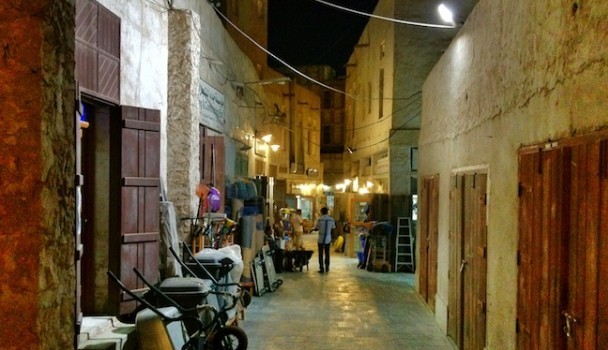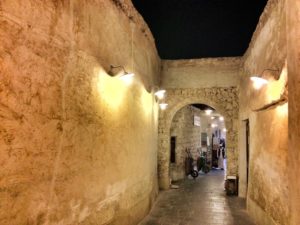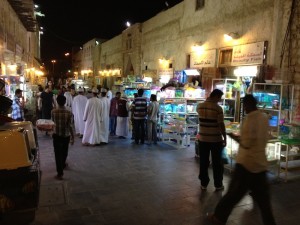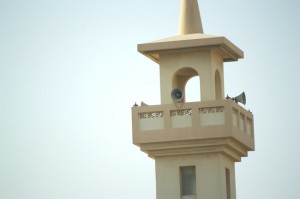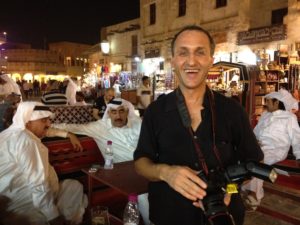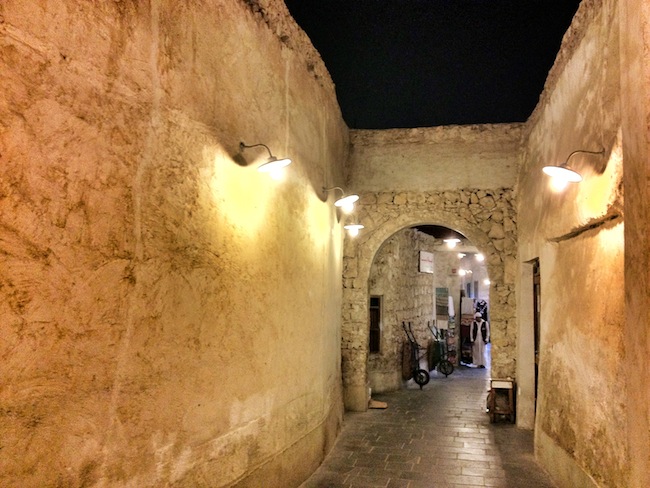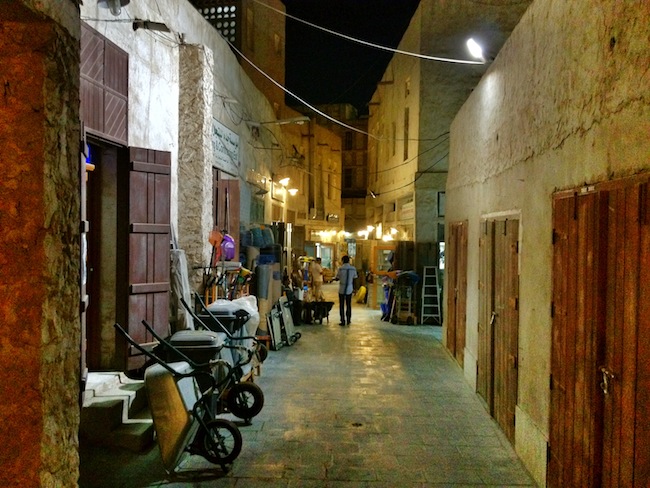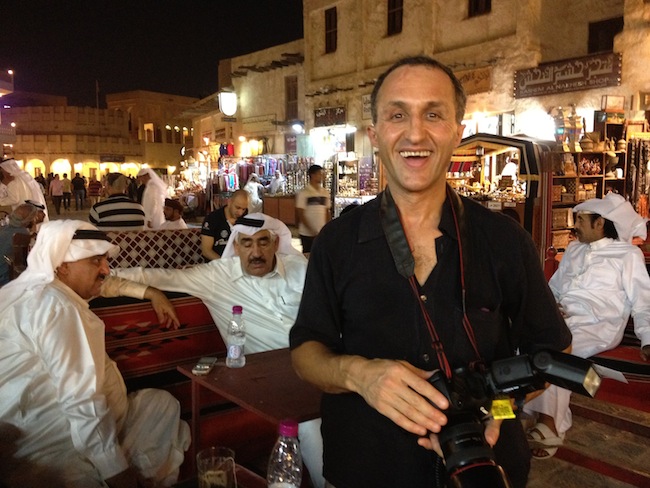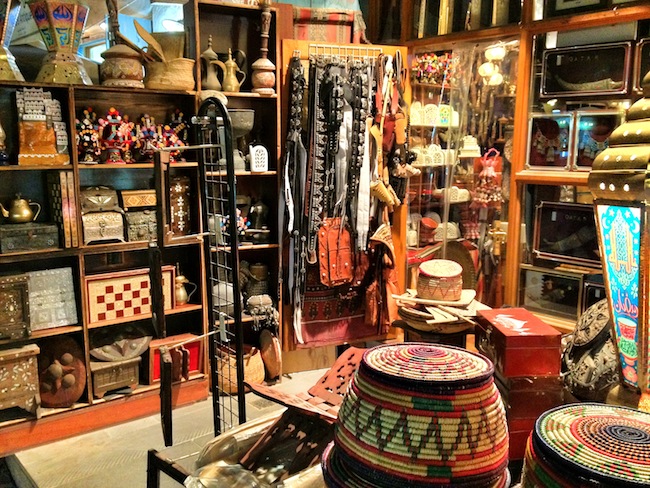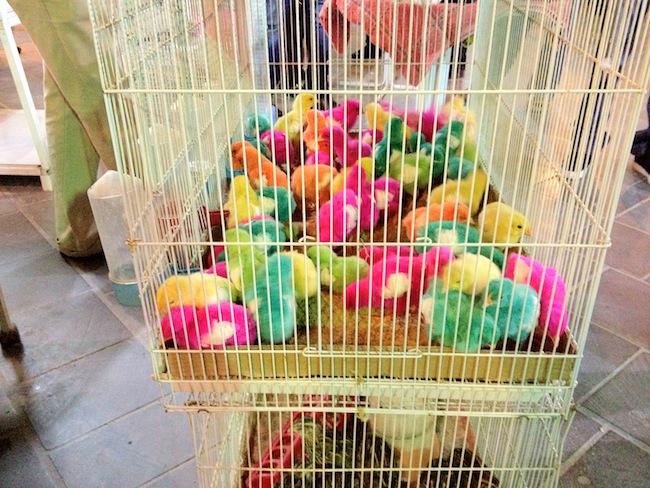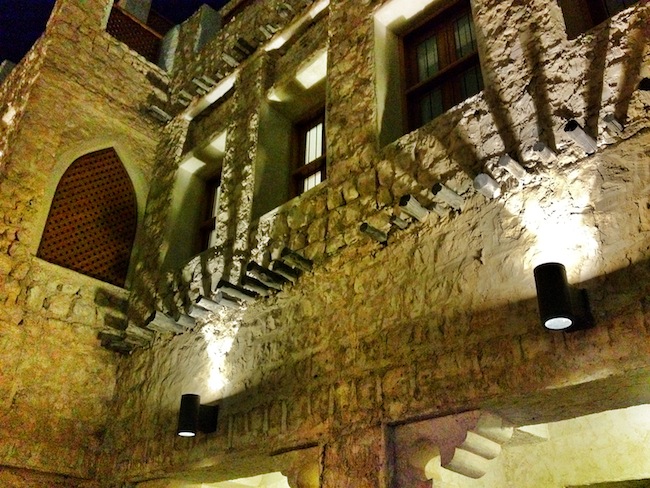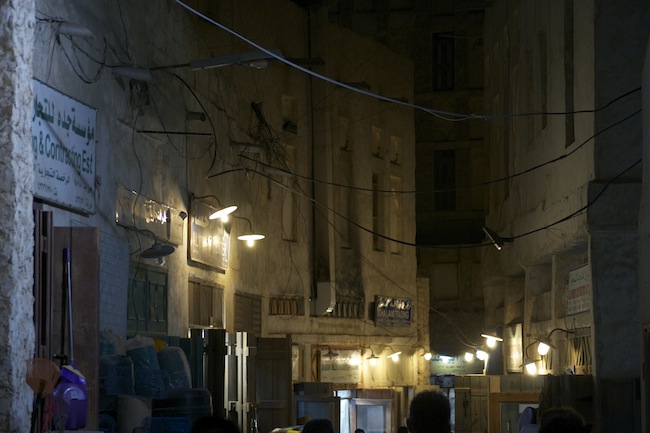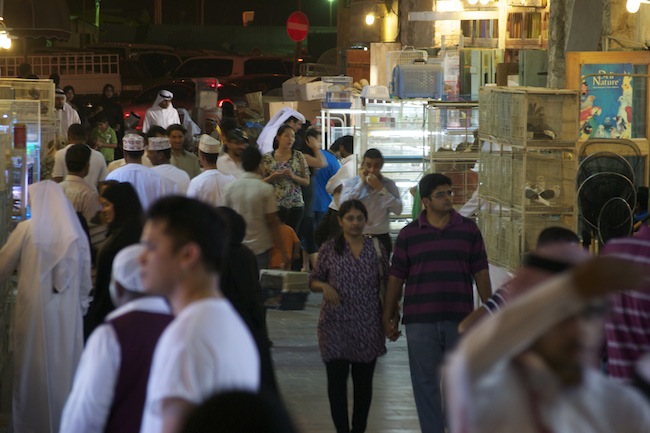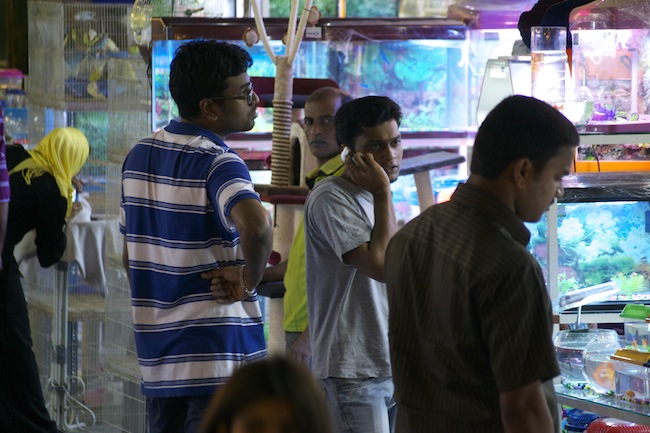As with all things Doha, even the old is new. The traditional market, Souk Waqif (“Souk” means “market” or “marketplace” in Arabic), has been completely restored and improved to theme-park perfection. It maintains its stuccoed walls and exposed wood, but it is sanitized enough to remind me of the way a Southern California restaurant might try to emulate old Mexico with fiberglass adobe exteriors. In other words, it was old, but it still felt brand-spanking new.
And yet, of the experiences I had in Doha, nothing moved me as deeply as my exploration through this meandering warren of buyers and sellers.
Yes, I finally managed to get away from the tour group. And shed of the mass of foreign humanity that had been surrounding me, I entered the market as a quiet giant, respectfully and slowly soaking up the culture around me, entirely determined to get lost in the labyrinth of twisting passageways.
Despite the attempts to modernize the souk, with some stalls adding glass fronts and air conditioning, there was no erasing a cultural approach to commerce that was thousands of years old. The smell of perfumes. The squawk of birds. The calls of sellers standing outside their stalls, holding up wares as I passed. Fresh paint and new flagstones couldn’t erase what the souk was really all about.
“You like this,” sellers would say with complete confidence. Or, “Come see.”
One particularly ardent seller, with a smile as bright as the sun, tried an even deeper psychological approach, winning me into his stall with a string of welcoming phrases. “Hello, hello! Welcome! You are my brother. You come. You come in and be comfortable. We are one, you and I. Come! Come in, my brother.”
The souk is literally a maze. I have a finely tuned sense of direction, so I always knew which direction to walk to reach a general area. But I nonetheless found it impossible to retrace my steps exactly if I wanted to return to an area of interest. I just had to keep moving forward. Which is in itself an object lesson of the souk and possibly a lesson about the culture that created it. Life itself is a maze of choices and opportunities. The souk possibly reminds us to choose wisely — to buy or not buy along the path — because each opportunity holds its rewards and penalties. You never know what’s around the next corner, or whether an opportunity passed by will ever come again.
Another lesson of the souk is that opportunity is what you make of it. Western culture, has truly lost the art of deal making. Bargaining has become a specialized profession that only executives play at when doing deals worth millions. Even the car-buying process is little more than trying your best not to get ripped off, rather than getting any real deal on the price.
In the souk, however, the art of bargaining belongs to every man and every woman. Each opportunity is a game of chess between buyer and seller. Sometimes you win and sometimes you lose. I did a little of both that night. But I always have loved the thrill of an item purchased after a negotiation. Because now that item is no longer just a thing — it is a story. Commerce is so much sweeter when it is wrapped in a fine story of a good deal.
The thing that surprised me most about the Souk Waqif, though, wasn’t the modernization or the cultural richness. What captured my heart were the people who walked the twisting paths.
Until I broke away from the larger group, the faces of the people around me had been stoic and possibly a bit distrustful. I know that look well. I live in New York and frankly no one can scowl down a group of tourists quite like a New Yorker. But on my own, my smiles were met with equally bright smiles in return. My laughs were met with equally rich laughter. And my hand was taken willingly in friendship.
Let’s just be honest here: Americans have a deep distrust of Islamic culture. Some of it is founded. After all, as I walked the souk that night, Islamic groups were protesting and attacking U.S. embassies around the Middle East. Yet, much of our distrust comes from a deeper prejudice toward religious values that seem antithetical to our way of life. It’s a wall of judgmental racism that blinds us to the warmth of a people that value friendship as an unmatched treasure, and family as a sacred bond.
Stepping out from behind that wall, however, I found such joy in this community. People would stop me and ask where I was from. Many assumed I was European, I suppose because they had their own assumptions that an American would never be this friendly to a muslim. They would talk to me or share their thoughts on life or the market. Then they would drift away along their own journey through the souk.
At one point, I found myself along a quiet, near deserted passageway, and as I walked along it the evening prayer began. It is an interesting evolution of Islam, this affixing of loudspeakers around the tops of mosque towers. At one time a man would stand at the top of the tower to call the faithful to prayer with song. But now as prayer time approaches, the city is awash with the call and it stopped me dead in my tracks.
I stood there in the darkness, soaking in the sounds of the lilting chant, feeling goosebumps race along my arms. The sound invoked both my prejudices and my wonder at the same time. I felt fear of what I didn’t know and desire to know more. It was a strange sensation. But it was exactly at that moment that a man approached me.
“Would you like to know Islam?” His expression was serious, but inviting as he proffered a book toward me.
In any other circumstance I might have politely declined. But instead I accepted the book with a nod. He then asked, “German or English?”
“English,” I replied, noticing he meant he had his books in several languages. To which he nodded and moved on.
Now don’t get me wrong. I did not convert that night, nor do I intend to. But maybe for the first time I was no longer offering feel-good, politically-correct, American-style lip-service to the idea of being tolerant of this faith that was so alien to me. As the prayer continued I let it wash over me, and I felt such amazing peace with myself and the world. This was Islam.
From that moment on the souk really opened to me. I laughed more richly as I listened to the stories from sellers. I sat with men drinking chakra chai, laughing and debating the merits of tea. The last vestiges of my uncertainty were washed away.
You can’t really know a place until you live there. That night I lived Doha. Now I can call Qatar one of my many homes.
We Blog The World featured writer, Bob Knorpp, is traveling in Doha, Qatar on behalf of the site this week. These are his dispatches from the tour and dining event sponsored by Qatar Airways.

Robert Knorpp is host of The BeanCast Marketing Podcast at thebeancast.com and is President of The Cool Beans Group, a marketing strategy consultancy based in New York City. He likes laughing even more than breathing. You can follow the madness on Twitter at twitter.com/BobKnorpp.

